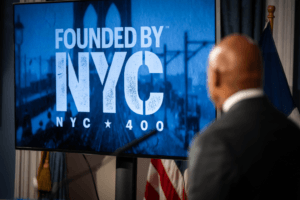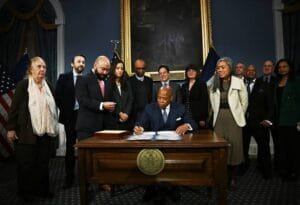Billion dollar deal to pave the way for NY universal child care if approved

Gov. Kathy Hochul has pledged a historic $7 billion in child care funding for New York families as part of this year’s state budget deal announced Thursday.
Lawmakers must still vote to approve the budget deal that Hochul said she’s reached with leaders of the state Assembly and Senate.
If passed, the multi-billion-dollar investment would be spread over the next four years, paving the way for universal child care and helping to stabilize an industry shaken by COVID.
Hochul said the deal would double how much the state currently spends on subsidized child care and expand the number of eligible families.
It’s unclear how the state will roll out the ambitious expansion, which would dramatically increase which families qualify for free care and steer more money toward providers.
“What we’re seeing in New York could propel us to the national forefront,” said Steven Morales, New York policy director for All Our Kin, a national nonprofit organization that supports child care providers who work out of their own homes.
Hochul did not share more specifics about the deal, and her office did not immediately respond to questions.
Two sources familiar with budget negotiations said they are expecting subsidies for free care to include families earning up to 300% of the federal poverty limits by August, up from the current 200%.
That means that a family of four earning around $83,000 would qualify for free child care. Previously the limit was around $55,500 for a family of four.
Some advocates were disheartened by the deal.
Alliance for Quality Education, which had pushed for a $5 billion investment next year alone, believes the plan falls short and will lead to a “slow roll out” that may force parents to remain on wait lists for years or “continue to be forced to pay high costs” for child care.
“The issue with all of this is that they are doing a lot more in terms of including more families with the 300% eligibility, but they’re not adding a lot more money, so it’s almost like this illusion that more families will get access to child care when they actually know the counties will run out of money quickly,” said Jasmine Gripper, executive director of Alliance for Quality Education.
In a significant loss for advocates, children who are undocumented will not be eligible for free care, leaving out an estimated 5,000 children across the state who are excluded from subsidied programs because of immigration status, according to an estimate from Empire State Campaign for Child Care.
Children who are citizens but whose parents immigrated without papers could still qualify for care, but advocates worried that work requirements would be a barrier for those families, especially those who “work under the books and get paid in cash,” Gripper said.











